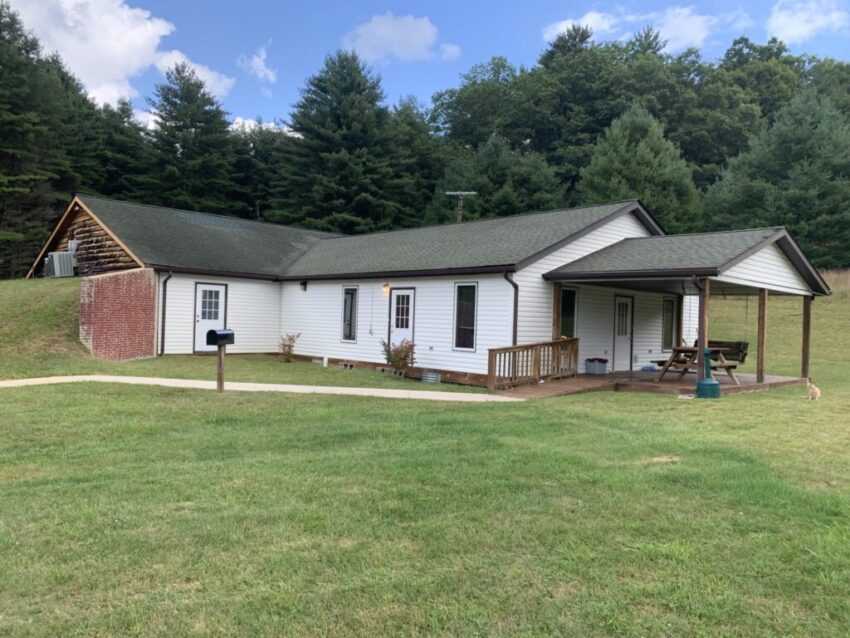The WVMR studio in Dunmore, W.Va. (Photo courtesy WVMR)
A radio cooperative serving Pocahontas County in West Virginia and two neighboring Virginia communities expects to lose more than half its annual budget after Congress passed a bill rescinding $1.1 billion previously approved for the Corporation for Public Broadcasting.
Allegheny Mountain Radio comprises WVMR in Dunmore, West Virginia, WVLS in Monterey, Virginia, and WCHG in Hot Springs, Virginia. The stations feature hyperlocal programming including news and entertainment, funeral and lost pets notices, weather, school closings and emergency alerts, station manager Scott Smith said.
The cooperative typically relied on federal funding for 60 to 65% of its annual budget, Smith said. They employ six full time and five part-time workers. Smith said the cooperative won’t make drastic cuts like layoffs or closing stations immediately. They’ll rely on reserve funds for now and look for ways to cut costs. They’ll also try to beef up support from underwriting, private donations and other funding opportunities, he said.

“This will be kind of a transition year, if you will, to where we see how things work without our federal money,” Smith said. “We’ll try to find other sources of income, and we’ll try to find sources we can save money at. But that’s also in the context of continuing on the way we are and what we do.”
While the Corporation for Public Broadcasting funded about 1% of NPR’s budget and 16% of PBS’s budget, Allegheny Mountain Radio is one of hundreds of small stations around the country who relied more heavily on the federal funding. CPB funding made up 19% of West Virginia Public Broadcasting’s budget. Executive director Eddie Isom told West Virginia MetroNews earlier this month it was too soon to say what the funding cut would mean for West Virginia Public Broadcasting.
Trump and other Republicans have criticized NPR and PBS broadcasts for being politically biased and called them a “waste of money.”
West Virginia’s entire congressional delegation, all Republicans, voted in support of rescinding the money. In separate statements after voting, Sen. Jim Justice called the legislation commonsense and said “the days of wasting money with zero regard for the taxpayer are over.” Sen. Shelley Moore Capito said the bill “eliminates wasteful spending.” Virginia Democrats voted against rescinding the money, while Republicans there voted in support of the bill.
Smith said he had several conversations with congressional leaders representing both Virginia and West Virginia explaining the importance of the station to its communities and the need for the federal funding.
“It didn’t really seem to move the needle, if you will, for the Republican side of the representatives I talked to,” he said.
When the legislation came on to Smith’s radar, he started trying to raise awareness, he said. Since the bill passed, he’s done interviews with national media outlets ranging from Politico to NBC’s Meet the Press and NPR.
“When the Senate passed this, on that Thursday, then the handwriting was on the wall,” Smith said. “And we quickly became the poster child for the collateral damage of this thing. And multiple people reached out.”

The media attention garnered the station more than 120 private donations from across the country as of Tuesday morning, he said. The majority of donors had never heard of the station before two weeks ago.
“Yet they heard our story, they looked into us, they said, ‘absolutely, you all should continue to exist. You all are important. And here’s some of our own hard earned money to make that continue to happen.’ That’s moving and validating in a way that you can’t really put into words.”
Several media outlets have asked Smith to explain the value of a small radio station in 2025, when many people get their news and entertainment from other sources. The stations are high in the Appalachian Mountains, he said, where cell service is spotty to nonexistent, he said. The people they serve are older.
“We are still out here providing all the things that I told you for people that may not necessarily turn to their smartphones for their morning news or their music or whatever it is that they’re looking for. They still prefer and use traditional forms of media like us.”
The radio stations are especially important after severe weather events like in 2012, when a derecho knocked out power, phone lines and other infrastructure to much of the state for days. The radio station was still broadcasting to anyone with a car or battery-powered radio, he said.
“We were still on the air broadcasting to anyone that could hear us about where cooling stations, where you could get water, where you could get supplies, when your utilities might come back — just the whole situation,” he said. “So there’s definitely a place for radio in today’s world.”
This story originally appeared in West Virginia Watch, which is, like the Virginia Mercury, part of States Newsroom.
YOU MAKE OUR WORK POSSIBLE.
Click this link for the original source of this article.
Author: Lori Kersey
This content is courtesy of, and owned and copyrighted by, https://www.virginiamercury.com and its author. This content is made available by use of the public RSS feed offered by the host site and is used for educational purposes only. If you are the author or represent the host site and would like this content removed now and in the future, please contact USSANews.com using the email address in the Contact page found in the website menu.








